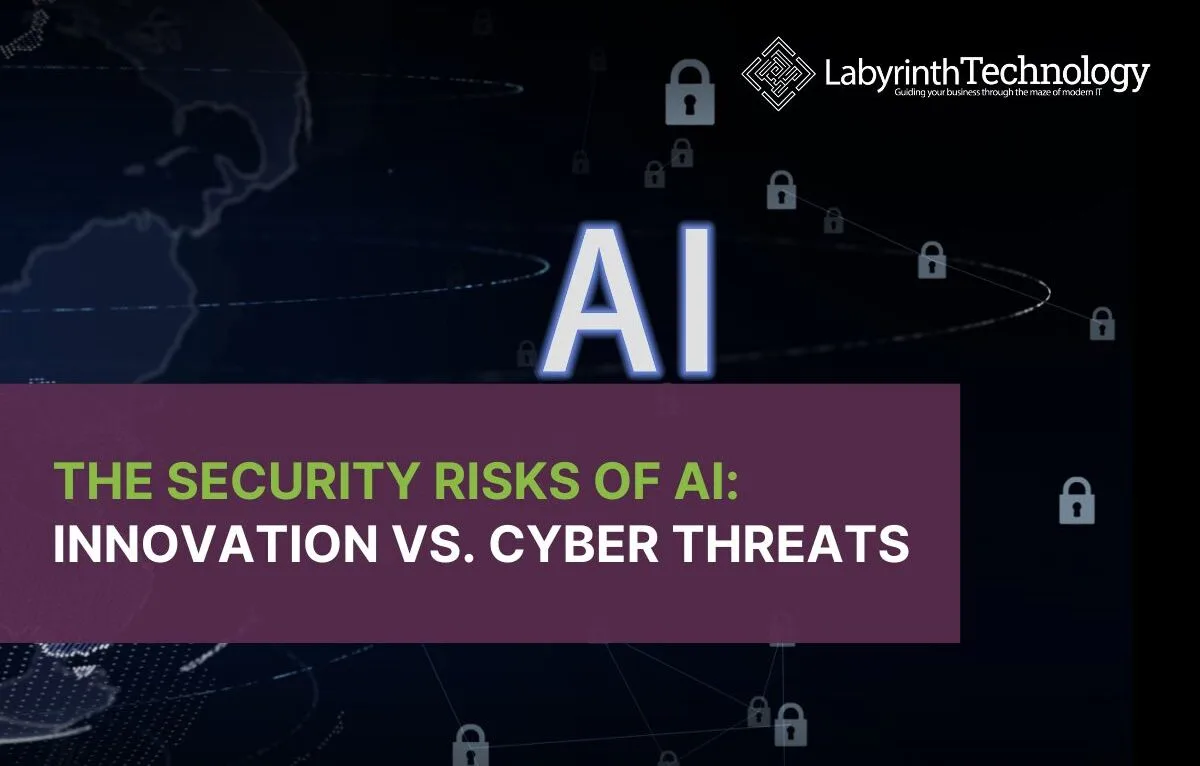
Artificial intelligence is rapidly reshaping the way businesses operate, making processes faster, smarter, and more efficient. From automating tasks and analysing vast amounts of data to enhancing customer service and even cyber security itself, AI has become a game-changer in almost every industry.
But while AI-powered tools bring undeniable benefits, they also introduce serious security risks—many of which are still being overlooked. The recent DeepSeek AI security breach is a perfect example of how even the most promising AI-driven companies can suffer from major security failures. Sensitive data, API keys, and backend details were exposed, putting users at risk and raising a major red flag about the growing vulnerabilities within AI systems.
With businesses rushing to integrate AI into their operations, the question needs to be asked: Are security risks being sidelined in the race for AI innovation? And if so, what can businesses do to protect themselves?
There’s no denying that AI is transforming the business world. Companies are using AI to automate workflows, analyse trends, and even detect cyber threats. But at the same time, cybercriminals are using AI too, and this is where things get complicated.
AI doesn’t just make security stronger—it also makes attacks more dangerous. Hackers are leveraging AI to create hyper-realistic phishing emails, deepfake scams, and adaptive malware that can outsmart traditional security defences.
The DeepSeek AI security breach should serve as a wake-up call. This AI startup, positioned as a potential ChatGPT competitor, reportedly left sensitive API keys, backend details, and other confidential information exposed.
What does this mean? Hackers could have easily accessed and exploited the exposed data, potentially taking control of the AI system, altering responses, or stealing information from users. While DeepSeek acted quickly to fix the issue once it was discovered, the fact remains—this breach could have been avoided entirely had stronger security measures been in place from the start.
This is a classic case of security playing second fiddle to innovation. Many AI companies, in their race to develop and launch new products, overlook fundamental security practices. DeepSeek is just one example of what happens when cyber security is not prioritised, but it won’t be the last.
And here’s the bigger question: How many other AI platforms have similar vulnerabilities that simply haven’t been exposed yet? With businesses increasingly integrating AI-driven platforms into their daily operations—whether for automated decision-making, customer interactions, or even cyber security itself—it’s crucial to ensure that these platforms are secure from the outset.
The takeaway? Security must be built into AI from the ground up, not as an afterthought. Companies cannot afford to fix security issues reactively—they must be proactive in protecting sensitive data from the start.
Data privacy is a growing concern as businesses increasingly rely on AI-powered tools. Many of these tools process confidential business information, customer data, and financial records—but do you know where that data is stored or how it’s being used?
Some AI companies store data to improve their algorithms, but this could mean your sensitive business information is sitting on third-party servers, potentially at risk of exposure. Worse, if an AI tool has a security flaw, cybercriminals could gain access to valuable data.
Before adopting any AI solution, it would be great for businesses to know:
Not knowing the answers to these questions could lead to compliance violations, regulatory fines, and serious security risks.
Hackers are no longer relying on basic phishing attempts or brute-force attacks. AI has supercharged their capabilities, making cyberattacks more sophisticated and harder to detect.
If cybercriminals are using AI, then businesses need AI-powered security solutions to keep up. Traditional security tools alone might not be enough.
Just because AI introduces security risks doesn’t mean businesses should avoid it altogether. The key is to adopt AI with security in mind. Here’s how:
At Labyrinth Technology, we understand that while AI offers incredible opportunities for businesses, it also introduces new and evolving security risks. As a trusted Managed Service Provider (MSP) with a strong focus on cyber security, we help small and medium-sized businesses navigate the complexities of AI safely. Our team of IT security experts ensures that businesses can leverage AI without exposing themselves to unnecessary risks, whether it’s securing AI-powered tools, protecting sensitive data, or implementing robust cyber security measures to combat AI-driven threats like phishing and malware.
We take a proactive approach, providing risk assessments, compliance checks, and ongoing security monitoring to keep businesses one step ahead of cybercriminals. If you’re integrating AI into your operations or simply want to fortify your cyber security strategy, Labyrinth Technology is here to help—so you can focus on growth while we keep your business secure. Contact us today.
Empowering London Businesses with Efficient IT Solutions to Save Time and Stay Ahead of the Competition.